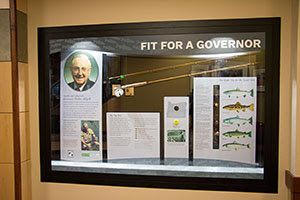
Commission sets groundfish seasons, delays Wolf Plan adoption
by ODFW
12-10-2017
Website
The Fish and Wildlife Commission set regulations for recreational and commercial groundfish seasons at their meeting in Salem.
The state’s regulations are based on federal quotas. After hearing public testimony, the Commission adopted a five fish bag limit (reduced from seven this year), in hopes of providing a year-round fishery in 2018. (The 2017 bag limit design was higher at seven fish, which was not sufficient to provide for year-round fishing, prompting an early closure that disrupted coastal charter businesses and anglers.) The Commission also approved an offshore longleader fishery with a 10-fish bag limit from January-March and October-December (though an April-September season may be added if federal regulations are adopted). Longleader gear can better target offshore rockfish species and lessen pressure on nearshore black rockfish. Further in-season adjustments to groundfish seasons could happen if needed to keep under allowed harvest levels and ODFW is committed to monitoring and reporting effort and catch at more frequent intervals. The cabezon fishery will remain the same (open July 1-Dec. 31 with bag limit of one cabezon). For more details on the 2018 recreational season visit myodfw.com/sport-groundfish-seasons-0
ODFW staff presented a working copy of the Draft Updated Wolf Conservation and Management Plan, showing the edits staff have made to the Plan since April 2017 as a result of comments from stakeholders, the public and commissioners. A panel of representatives from Wolf Program stakeholder groups also testified about the latest Plan. The Commission decided more time was needed to work on the Plan and opted to delay adoption, so they will not be considering it at their next meeting on Jan. 19, 2018 in Salem. A new meeting date will be announced once it’s decided.
In other business, the Commission:
- Denied a petition to amend freshwater angling regulations for naturally produced spring Chinook salmon in the Rogue River.
- Approved a five-year culvert repair agreement between ODOT and ODFW that will allow ODOT to make critical repairs to aging culverts in a cost-effective manner without having to meet full fish passage criteria. As part of the agreement, ODOT will improve fish passage at each site and fund high priority fish passage restoration projects off the state highway system to offset delayed passage at culvert repair locations.
- Appointed Al Pazar as the fishing representative and John Shaefer as the Tribal representative to the Ocean Acidification and Hypoxia Council and Mary Wahl and Bruce Taylor to the Oregon Agricultural Heritage Commission.
- Appointed Dave Grosjacques and Susan Chambers as representatives to the Restoration and Enhancement Board and approved funding for several R and E projects to improve fisheries or recreational fishing opportunities.
- Extended the maximum age for youth to participate in the Mentored Youth Hunter Program from 13 to 15, per direction of the Oregon State Legislature. (This program is aimed at recruiting new hunters by allowing youth to hunt with a mentor without first passing a hunter education class.)
- Adopted rules to implement Ballot Measure 100/HB 2576 (the Wildlife Trafficking Prevention Act which made it illegal to purchase, sell or exchange elephant, rhinoceros, whale, tiger, lion, leopard, cheetah, jaguar, pangolin, marine and leatherback turtles, sharks and rays).
Also there was a brief dedication ceremony for a new exhibit (see photo) at ODFW Headquarters featuring the bamboo fly rod of Vic Atiyeh, who served as Oregon’s Governor from 1979 to 1987. His son Tom Atiyeh attended.
The former Governor enjoyed fly fishing on public land. While he was Governor and with the help of non-profit Oregon Wildlife Foundation, Atiyeh helped coordinate the purchase of property along the Deschutes River that is now known as the Lower Deschutes Wildlife Area. The property is open to public fishing, hunting, wildlife viewing and other outdoor activities and is one of 16 major wildlife areas in the state. “Today, we have the product of all [Atiyeh’s] efforts—the ability to access the river,” said former ODFW Director Lindsay Ball, speaking during the ceremony. “Atiyeh was a great advocate for fish and wildlife resources.”
The Commission’s next meeting is Jan. 19 in Salem at ODFW Headquarters.
Photos
Website Hosting and Design provided by TECK.net
